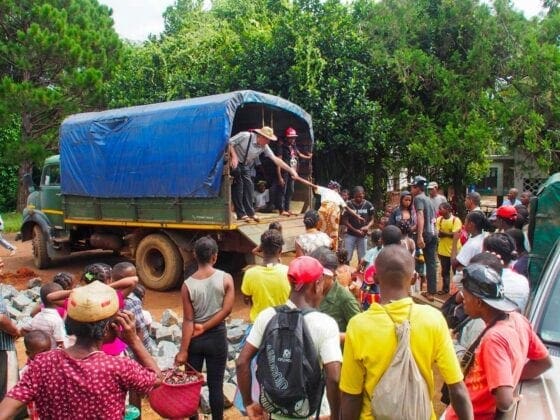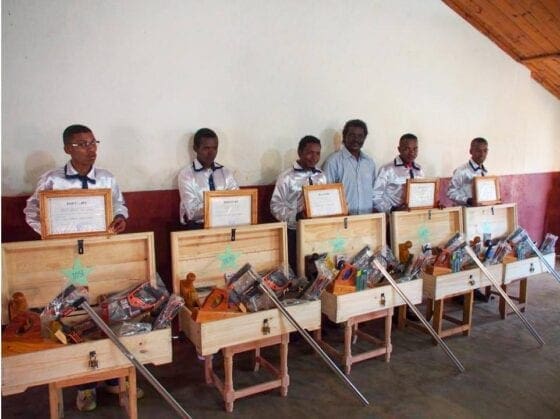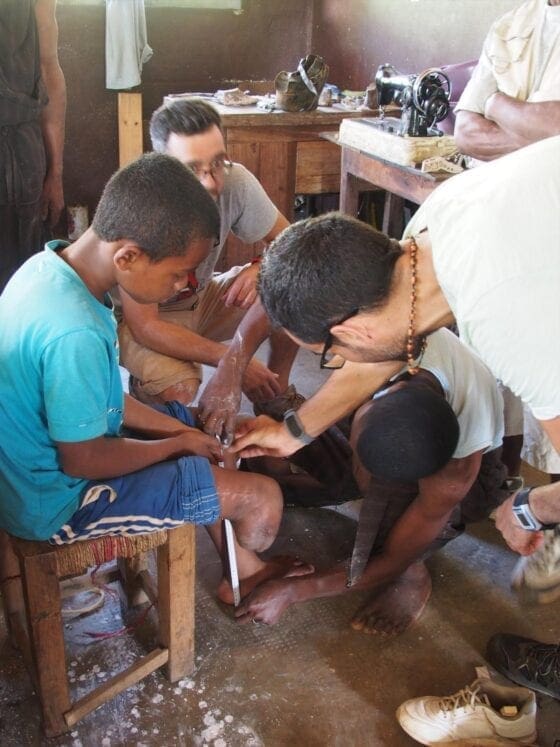In preparation for the visit of Pope Francis to Madagascar that will take place from September 7 to 10, we want to present another of the extraordinary works carried out by the missionaries of the Congregation of the Mission. Father Émeric Aymot d’Inville is the head of the venue, responsible for the work of Foyer Tanjomoha.
A Home for Life, especially for the disabled. – The “Tanjomoha Residence” is located at Vohipeno, on the southeast coast of Madagascar. It’s mission is to welcome the poorest and most abandoned of the surrounding Malagasy society to assist them in finding lasting solutions to heartbreaking limitations that they could never manage on their own. Founded in 1986 by Father Vincent Carme, Vincentian Missionary, it is led by members of this same congregation, in close collaboration with a community of Daughters of Charity.
– The “Tanjomoha Residence” is located at Vohipeno, on the southeast coast of Madagascar. It’s mission is to welcome the poorest and most abandoned of the surrounding Malagasy society to assist them in finding lasting solutions to heartbreaking limitations that they could never manage on their own. Founded in 1986 by Father Vincent Carme, Vincentian Missionary, it is led by members of this same congregation, in close collaboration with a community of Daughters of Charity.
– Young people with motor disabilities were at the heart of Father Carme’s concern when he founded the Tanjomoha Residence and this continues to be true today. These poorest of the poor have no state support; they constitute a heavy burden for their families, themselves often destitute, who sometimes reject them. Because of costly procedures, special education and wearing orthopedic equipment, parents are unable to provide any medical treatment for their children with disabilities. In addition, families also often do not send them to school, so young disabled people stay at home, sitting around doing nothing. This residence exists to meet such crucial needs, offering these young people both an effective treatment of their disability and an education updated to new possibilities all to help them to lead the most independent life possible:
 Established based on serious research in adaptation:
Established based on serious research in adaptation:
“It is through education,” said Fr. Carme, “that we can offer a job to young people with disabilities, as well as better social integration and a fulfilling family life.” We find, therefore, at the Residence:
– a literacy class for those who cannot read or write: headed by a specialized teacher, herself disabled, Mrs. Léonie,
– a school of sewing and embroidery, the school housewives’ program: led by a sister and assisted by four teachers, this school effort is designed for girls but is open to those boys who have the taste. Upon graduation, each will receive a sewing machine as a gift to enable them to fit into the world of labor.
– a workshop for learning carpentry: there’s a sector open to disabled boys who have enough strength in the arms and have at least a good leg, because this training requires a fairly good balance and more physical strength. Students learn to make all kinds of furniture from straight stools to chairs, beds, wardrobes, panel doors, school benches, windows,
Tanjomoha Residence, Madagascaretc. Here again the practice is of special importance, which is marked by the average of 12 as the minimum average. On leaving, they receive with their diploma a well-stocked toolbox so that they can work and earn a living. A Vincentian Missionary, Father Prosper, runs the school of carpentry. Three monitors assist him.
The residence also offers the opportunity for young people to continue their secondary studies and send them to Sainte Geneviève College, run by the Daughters of Charity where they prepare for the BEPC or the BAC. We also help them to pursue higher education such as management, languages, electronics, or paramedics. A case in point is that of Julien who went as far as his doctoral degree in management.
We felt that practical knowledge of IT and applied management offered a better chance of finding a job. That is why we created, at the end of 2013, with the encouragement of our superiors, Visitor Lazarist and Bishop, a two-year training of BTS type, called ESIGAT (School of Computer Science and Applied Management Tanjomoha). Mainly, this training welcomes disabled graduates and capable young people from our other homes, Deguise and De Carme.
BTS type, called ESIGAT (School of Computer Science and Applied Management Tanjomoha). Mainly, this training welcomes disabled graduates and capable young people from our other homes, Deguise and De Carme.
Actual disability treatment: the treatment of disability is an integral part of the Tanjomoha Residence project. It is one of two essential components, along with studies. It aims to provide young disabled people the maximum physical autonomy possible. There are various means available to these young people:
– Orthopedic testing: which is done each year in June by a team of doctors, physiotherapists and technicians for fitting, who come from the CRMM of Antsirabe,
– Orthopedic surgical operations: First performed at the CRMM Antsirabe, they are done since 2008 in Vohipeno, at the Henintsoa hospital, run by the Sisters of Mercy, close to Tanjomoha,
– Rehabilitation: The treatment of disability consists mainly in rehabilitation and the wearing of orthopedic equipment. Young people with disabilities who study at home must do one hour of rehabilitation a day under the direction of Sister Honorine, assisted by two assistants.
– Orthopedic shoe repair: While they traditionally worked only in leather and iron, in September 2016 they moved to the manufacture of prostheses with plastic tips and levers also in plastic, thanks to the technical support of a Spanish specialist who also provides us with all the necessary materials and components (machined tubing, prosthetic feet, resin, and other necessary materials.
Support for other types of disabilities:
Schooling for the blind and visually impaired: at-home studies for 25 young blind and visually impaired in specialized schools in Farafangana, at an old institution held by Protestant Lutherans, and more recently in Fianarantsoa, at Ephata School, administered by the Sisters of Mary Immaculate.
– Schooling for deaf-mute and hearing-impaired: the residence is also providing studies for 25 deaf- mutes and hearing-impaired at a specialized school in Antsirabe, administered by Protestant Lutherans who are pioneers in this area.
– Schooling for mentally handicapped young people: the home helps a dozen children and young people with mental disabilities to study in a specialized school in Manakara, the CES, which is a branch of the Presentation of Mary College, run by the Daughters of Charity.
Finally, in addition to the studies discussed above, the educational project set up by the Tanjomoha Residence includes moral education and a plan for spiritual formation. As we follow the Residence’s activities, our next article will continue these reports for you.
By: Dario Jean, CM – Province of Madagascar
Translated from French into English by Dan Paul Borlik, CM
www.tanjomoha.com
www.facebook.com/tanjomoha
Foyer Tanjomoha
BP30, Vohipeno
Madagascar

